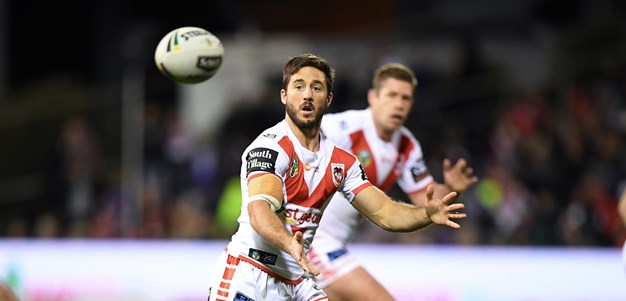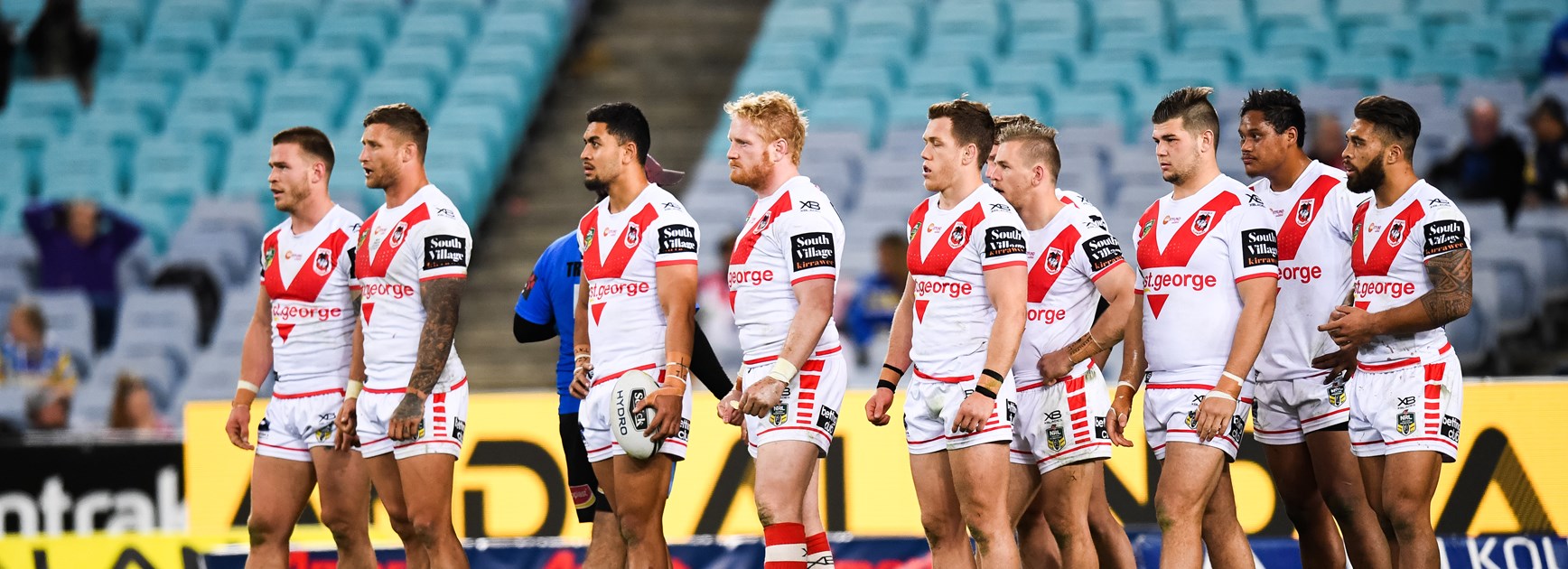
It's clear based purely on results that the St George Illawarra Dragons are in a form slump, but it's when you take a closer look at the numbers that you see there is a serious cause for concern for Red V fans.
Mid- to late-season fadeouts are sadly nothing new for Dragons fans; the club was first after round 12 last year and missed the finals while in 2016 they were eighth after 18 rounds and finished 11th.
In 2015 they were first after 12 rounds before falling out of the eight altogether by round 19 before recovering to finish eighth and bowing out in the first week of the finals. In 2014 they were top after four rounds and fell out of the out for good in round eight.
But arguably the difference between St George Illawarra's best and worst in 2018 is as dramatic as in any of the past five seasons.
They exploded out of the blocks with a 34-12 win over the Broncos in round one – the biggest win of the opening round – and kept their spot atop the Telstra Premiership ladder (other than a two-week period when Penrith nudged ahead in rounds 12-13) until their 52-30 round 17 loss to the Storm.
That kicked off a spell of five losses in six games that has so far dropped them from first to fifth and in genuine trouble of dropping to seventh or lower if they don't find a win soon.
Dufty: Dragons will finish top four
It's not just the five losses that are the problem though – it is the manner of them, with some truly alarming trends emerging.
Last on the ladder over the past six rounds
Splitting the Dragons' season into two chunks – rounds 1-16 and rounds 17-22 – there has been a drop off in attack, in defence, in ball-handling and execution.
Doing a competition ladder for this second period would land the Dragons dead last of all 16 clubs with the Titans the only other side to win just once from round 17, according to NRL.com Stats.
The leader through this period is the unbeaten Roosters while the Wests Tigers and Eels are second and third respectively as the former chase an unlikely finals berth and the latter do their best to rise above wooden spoon contention.
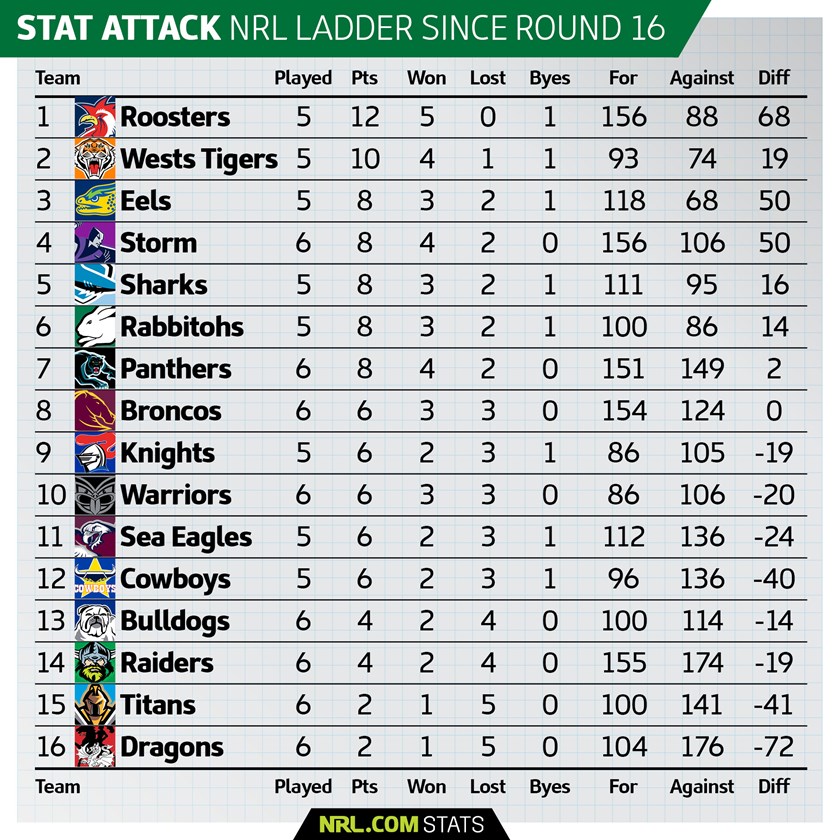
The rest of our round 17-22 ladder is made up of teams that are in the actual top eight with the Storm, Sharks, Rabbitohs, Panthers and Broncos (in that order) filling spots from fourth to eighth.
The Warriors (10th) and Dragons (16th) are the only current top-eight sides in the bottom half of the six-round ladder.
The Dragons have conceded the most points of any club in that period with 176, just ahead of Canberra (174). The improving Eels, remarkably, have conceded the fewest points over the past six rounds (68), ahead of Wests Tigers (74) and Rabbitohs (86). It's worth noting those three teams have played just five games courtesy of the round 17 bye.
Opponents now running through the middle
One of the most alarming numbers underpinning that defensive slide is the drop-off in the Dragons' defensive effectiveness through opposition yardage sets, with opponents now making metres through St George Illawarra far more easily.
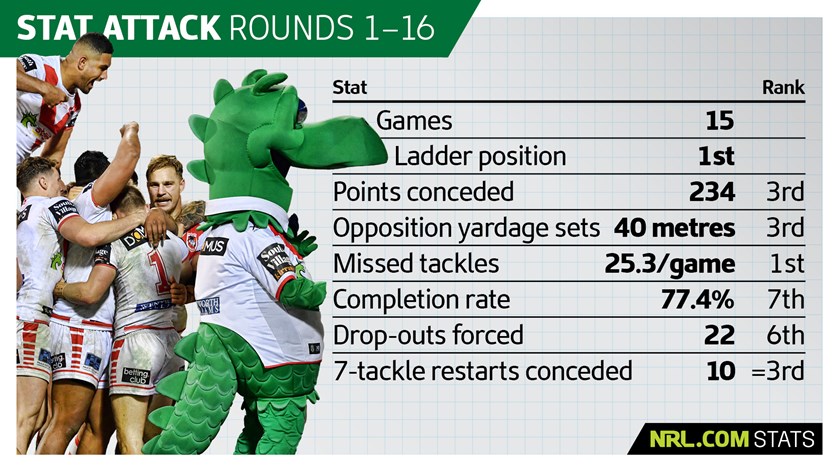
From round 17, the Dragons are conceding the most metres of any club per yardage set (defined as a set in which the opposition starts inside their own half). Dragons opponents make 48 metres per set in this period, a whopping 20% increase on the 40 metres per set they were restricting opponents to in the first 16 weeks.
The Dragons are also worst in terms of conceding post-contact metres in this period at 542 PCM per game. For rounds 1-16 they conceded the second-lowest figure of 426 PCM per game.
In addition to failing to halt momentum, the Dragons are simply falling off more tackles too. Through rounds 1-16 they missed 25.3 tackles per game (best in NRL) but since then it is up more than six per game to 31.8 (eighth best). Those misses are becoming slightly more expensive as the team becomes less efficient at scrambling – in rounds 1-16 it took an average of eight misses for each line break conceded but that has dropped to 5.9 misses per line break since then.
Problems off the ball, problems on the ball
The Dragons were seventh-best in terms of completion rates for 16 rounds (77.4%) but have been third-worst since at 74.2%.
In rounds 1-16 they averaged 10.1 errors per game (seventh best); since then they have the third-most with 64 at 10.7 per game.
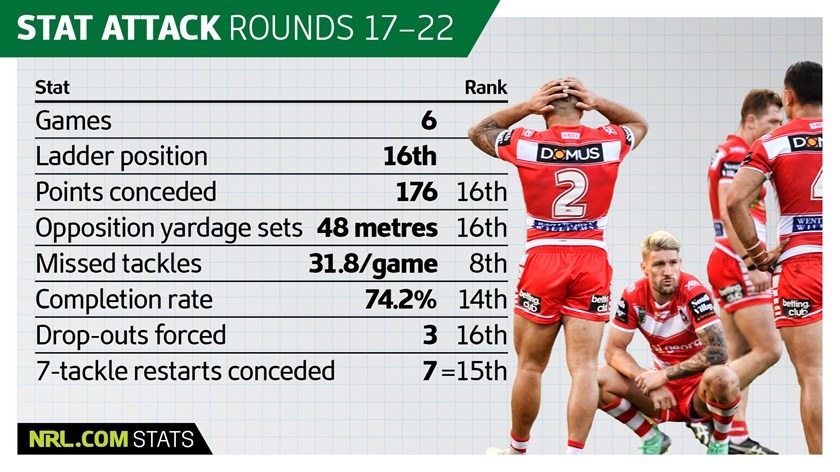
The team's short kicking game has also been poor over the past six weeks. Previously they were giving up 0.67 seven-tackle sets per game or just 10 in 15 games but since then it has been almost double the rate, at 1.2 per game (seven in six games). The flipside of that is forced drop outs have dried up; they kicked 22 in 16 rounds at 1.47 per game but have just three in their past six games at 0.5 per game.
The kicking game and the errors and, to a much lesser extent, penalties (see below) have all combined to starve the Dragons of the ball which has exacerbated all the other problems. Through 16 rounds they held the most ball (53.2%) and since then they have held the least of any team (47.3%).
That has forced them to go from being the team that made the fewest tackles (300.1 per game through 16 rounds) to the team that makes the most (362 per game since Origin) of any club.
Looking for solutions in the wrong place as players blame penalties
Pressed to explain the form slump at a Dragons club media day this week, players blamed just about the only statistical category that has not been a problem – penalties.
A glut of early penalties against the Eels, which culminated in Cam McInnes being sin-binned (on top of Matt Dufty being sin-binned a week earlier), proved costly and may have caused some recency bias.
The Dragons were the least-penalised team through 16 rounds (113 at 7.5 per game) and are averaging fewer penalties per game since then with just 35 in six games at 5.8 per game.
The nine penalties against Parramatta was the most in a game in the recent form slump but their next most, eight, came in the lone win against the Cowboys. In the other four losses against Melbourne, Wests Tigers, the Roosters and Warriors they have conceded just 15 penalties at 3.75 per game.
McInnes says it could be a case of trying too hard to turn things around.
"I think at the moment because we are not playing as well as we want you look to force things and then penalties come, errors come," he said.
"Everybody wants to help the team and do the right thing but sometimes the harder you try it can be to the detriment.
"That just comes down to being disciplined and patient. Myself, I had an error in the third set [against the Eels] after we started well and you can't afford that because that just automatically puts pressure on you.
"There were a lot of penalties blown against us in the first 20 minutes and they completed a lot better than we did, and that's the game right there. It is not from lack of effort or trying, it is just wanting to do more than you need to do."
Ben Hunt: We're not chokers
Tariq Sims said avoidable errors were hurting the team.
"We are just giving far too many penalties away in the crucial times of the game and the last two weeks we have had a man off the field in the sin bin," he said.
"We have been giving some crucial penalties away at crucial times during the game so it is something we need to address.
"It's just silly things. I have been guilty of being half a step offside and as a football team we can't leave that in the hands of the referees."
Edge defence had also deteriorated of late, Sims added.
"Also, decisions on our edges, the middles are working really hard for us but we are leaking points on the edges so we need to really shore up that area," he said.
Utility Kurt Mann also lamented the penalty count.
"We kick long, trap them in the corners and then we give away penalties," Mann said.
"At the start of games we are rolling 70 metres down the field and put a good kick in but then we give away a penalty and it gets compounded by giving another one away. They kick the ball 40 metres and go down the field then we give another one away at the end of the set."
Despite having one of the easiest runs home on paper, with matches against bottom-eight sides Wests Tigers, the Bulldogs and Newcastle, if the Dragons don't address their problems and find some winning form they remain a chance of slipping out of the eight by finals time. They appeared to have the one of the easiest draws this time last week but it counted for little as the last-placed Eels ran roughshod over them.




